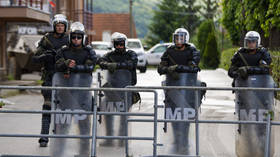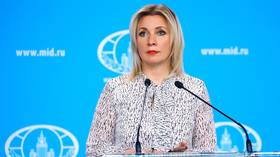
The decision was announced after a violent standoff between the peacekeepers and local Serbs

NATO peacekeepers in Zvecan, northern Kosovo, May 30, 2023. © AP Photo / Marjan Vucetic
The NATO bloc will deploy 700 additional peacekeepers to Kosovo, where 30 troops were wounded during clashes with local Serb protesters. Another battalion will be placed on high alert in the event of further escakation.
NATO Secretary General Jens Stoltenberg announced the move during a Tuesday press briefing, saying the deployment was a response to recent “attacks” on the peacekeeping force, which he said were “unacceptable.”
Stoltenberg urged officials in Pristina and Belgrade to take “concrete steps” to de-escalate the situation, and said the two sides should participate in an EU-brokered dialogue.
Violent clashes between local Serbs and NATO’s Kosovo Force (KFOR) erupted after peacekeepers attempted to disperse demonstrators protesting the inauguration of a an Albanian mayor in a Serb-majority area. The standoff resulted in dozens of injuries on both sides.
The unrest came after local Serbs, who have long sought autonomy in Kosovo, boycotted Pristina-backed elections in several regions of Serbia’s breakaway province. Despite a turnout of less than 4%, local authorities accepted the votes as legitimate, announcing the election of four Albanian mayors.

Read more
KFOR was first established in 1999 in the wake of NATO’s intervention in the Kosovo conflict on behalf of Kosovar Albanians and the bloc’s months-long bombing campaign in Serbia. The force consisted of around 50,000 troops at its height, but has since declined to about 3,700 soldiers today.
Kosovo has seen several waves of unrest since the 1999 war. In 2008, the Western-backed Albanian authorities unilaterally declared independence from Belgrade. The move was quickly backed by the United States and many other Western countries. Russia and China are among the states that continue to view Kosovo as part of Serbia.
Moscow has said NATO is largely responsible for the recent spike in hostilities. Russian Foreign Ministry spokesperson Maria Zakharova accused the alliance of becoming “a source of unnecessary violence” and an “escalation factor” in the region. She urged the bloc to “silence its false propaganda” against local Serbs, who she said had been wrongly blamed for provoking incidents.




